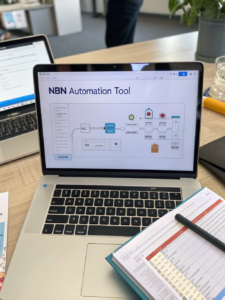Transform or Be Transformed: How Digital Transformation Drives Business Success
Navigating the Future: A Holistic Approach to Digital Transformation Business Strategy The business landscape is shifting at an unprecedented pace. Technological advancements, evolving consumer expectations, and global economic forces demand a fundamental rethinking of how organizations operate. At the heart of this evolution lies digital transformation business strategy. It’s no longer a futuristic concept but a critical imperative for survival and growth. This comprehensive guide explores how to build a robust digital transformation business strategy that leverages the power of social media, crypto markets, AI-driven automation, strategic stock investments, and alternative investment strategies to secure a competitive advantage. We'll delve into emerging trends and actionable steps to help you thrive in the digital age. The Core of Digital Transformation: Beyond Technology Implementation Many businesses mistakenly equate digital transformation solely with adopting new technologies. While technology is a crucial enabler, true digital transformation is a holistic process that encompasses organizational culture, customer experience, and operational efficiency. It requires a fundamental shift in mindset, embracing agility, data-driven decision-making, and continuous innovation. To create a successful digital transformation business strategy, you need to: Define Clear Objectives: What do you aim to achieve through digital transformation? (e.g., Increased revenue, improved customer satisfaction, streamlined operations). Assess Current Capabilities: Identify strengths, weaknesses, opportunities, and threats (SWOT analysis) related to your digital readiness. Prioritize Key Initiatives: Focus on initiatives that align with your business objectives and deliver the most significant impact. Foster a Culture of Innovation: Encourage experimentation, learning, and adaptation throughout the organization. Embrace Data Analytics: Leverage data to inform decision-making and continuously optimize your digital initiatives. Social Media: Building Your Digital Brand and Driving Engagement Social media has evolved from a communication tool to a powerful marketing engine. A well-defined social media strategy is integral to any successful digital transformation business strategy. It provides unprecedented opportunities to connect with target audiences, build brand loyalty, and drive sales. Personalized Customer Experiences: Use social listening tools to understand customer needs and preferences, and tailor your content accordingly. Influencer Marketing: Collaborate with relevant influencers to reach new audiences and build credibility. Content Marketing: Create valuable and engaging content (videos, infographics, blog posts) that resonates with your target audience. Social Commerce: Integrate e-commerce functionalities into your social media platforms to facilitate direct sales. Community Building: Foster active online communities where customers can connect with your brand and with each other. AI Agents & Automation: Boosting Efficiency and Productivity Artificial intelligence (AI) and automation are revolutionizing business processes, creating opportunities for significant efficiency gains and cost reduction. AI agents, in particular, are poised to transform customer service, sales, and operations. Automated Customer Service: Implement chatbots and virtual assistants to handle routine inquiries and provide 24/7 support. Process Automation: Use Robotic Process Automation (RPA) to automate repetitive tasks, freeing up employees for more strategic work. Data Analysis & Insights: Leverage AI algorithms to analyze large datasets and uncover valuable insights that drive better decision-making. Personalized Marketing Campaigns: Utilize AI to create hyper-personalized marketing messages that resonate with individual customers. Crypto Markets & Alternative Investments: Diversifying Your Portfolio While seemingly unrelated to core digital transformation, exploring alternative investment strategies, including cryptocurrency, can provide a valuable risk management layer and potential for growth. However, caution and thorough research are paramount. Investment Strategy Description Potential Risks Potential Rewards Cryptocurrency (Bitcoin, Ethereum) Digital currencies built on blockchain technology High volatility, regulatory uncertainty, security risks High potential returns, decentralized nature NFTs (Non-Fungible Tokens) Unique digital assets representing ownership of items Speculative market, illiquidity, intellectual property concerns High potential for value appreciation Private Equity Investments in privately held companies Illiquidity, high minimum investment, lack of transparency Potential for high returns, access to growth opportunities Real Estate Crowdfunding Investing in real estate projects through online platforms Illiquidity, project risks, limited control Diversification, potentially higher returns than traditional real estate Consider diversifying your financial portfolio beyond traditional stocks and bonds. Understanding the nuances of digital business models in relation to these investments is increasingly important for navigating the evolving financial landscape. Stock Investments & Strategic Portfolio Management Traditional stock investments remain a cornerstone of many investment portfolios, but the digital age requires a more agile and informed approach. Focus on Tech Leaders: Invest in companies that are driving innovation and disruption in the digital economy, such as those involved in cloud computing, artificial intelligence, and cybersecurity. Data-Driven Stock Selection: Utilize financial analysis tools and data analytics to identify undervalued stocks with strong growth potential. Diversification: Spread your investments across different sectors and asset classes to reduce risk. Long-Term Perspective: Adopt a long-term investment horizon to ride out market fluctuations. The Importance of a Customer-Centric Approach Regardless of the specific initiatives undertaken, a customer-centric approach is paramount to successful digital transformation business strategy. Focus on delivering seamless, personalized, and valuable experiences across all touchpoints. Gather customer feedback using various channels, analyze customer behavior, and continuously adapt your offerings to meet evolving needs. This customer understanding is crucial to developing effective digital business models. Conclusion: Embracing the Digital Future Successfully navigating the digital transformation requires a comprehensive, strategic, and adaptable approach. By embracing social media, leveraging AI-driven automation, exploring alternative investment strategies, and prioritizing customer-centricity, businesses can unlock new opportunities and thrive in the digital age. Implementing a well-crafted digital transformation business strategy will be crucial for long-term success. What are your biggest challenges in digital transformation? Share your thoughts in the comments below! And don’t forget to share this article with your network. Ready to dive deeper? Explore these related resources: digital transformation business strategy digital business models
Share this content:














Post Comment